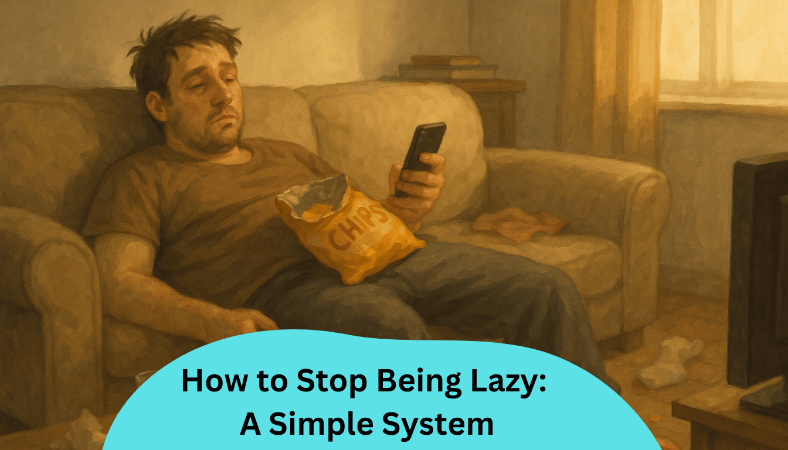Do you ever think of yourself as lazy? Well, I’ve got good news for you—you’re probably not lazy, just a human with a challenge to overcome.
The truth is, laziness isn’t a personality flaw, it’s usually a signal pointing to something deeper.
And in this guide, I’ll walk you through a straightforward, 4-step system designed to show you how to stop being lazy:
Finally Finish What You Start
You don’t need more information. You need the accountability to execute.

- Reset your mindset—replacing doubt with confidence.
- Recharge your mental and physical health.
- Set practical goals that feel achievable—not overwhelming.
- Build real accountability to keep you consistent and on track.
Takeaways
- Understand that laziness is often a signal, not a personality flaw, and can be addressed with a structured approach.
- Learn how to reset your mindset and combat negative self-talk to overcome feelings of laziness.
- Discover the importance of physical health in boosting energy and motivation to tackle daily tasks.
- Implement achievable goals, practical strategies, and accountability systems to maintain consistency and tackle laziness effectively.

The Simple 4-Step System to Overcome Laziness
If you’re stuck or just can’t shake that persistent feeling of “laziness”, you’re in the right place.
This simple, step-by-step system works because it tackles laziness at its root—guiding you gently but powerfully towards meaningful habits, renewed energy, and lasting momentum.
No endless willpower needed—just practical strategies and proven methods.
You’ll finally understand what’s really holding you back and start taking action with confidence.
Step 1: Reset Your Mind
Here’s the thing: conquering laziness isn’t a willpower battle—it’s a mindset shift. Because behind what you’re calling “lazy” are hidden beliefs, fears, or mental habits quietly sabotaging your progress.
How to Stop Being Lazy by Shifting Your Self-Perception
What feels like laziness is usually your mind hitting the brakes—because deep down you’re resisting something:
- fear of failure.
- overwhelm about where to start.
- uncertainty about what’s next.
When you recognize this, you move from beating yourself up to being empowered to act.
Here’s the truth – your habits will always match your self-image. See yourself as “lazy”? Your brain will prove you right.
But shift your identity to someone capable and proactive, and you’ll naturally begin taking actions aligned with that new version of yourself.
The Role of Negative Self Talk in Keeping You Stuck
Ever catch yourself saying things like “I’m hopelessly lazy,” or “I can’t stick with anything,” without even realizing it?
This kind of self-talk isn’t harmless—it’s silently shaping your beliefs and behaviors, trapping you in a self-fulfilling prophecy of inaction.
But here’s the powerful part: you’re not chained to those stories.
With small, daily mental shifts—like gentle affirmations, reframing your inner dialogue, or briefly noting your successes—you can reshape your thoughts, break free from negative patterns, and start building genuine momentum again.
Mental Health and Laziness: Know What’s Really Going On
Sometimes, what you label as laziness isn’t laziness at all—it’s exhaustion, anxiety, or even depression.
Before you judge yourself too harshly, consider that your lack of motivation might be your brain and body’s way of signalling they need your attention and care.
If you’re struggling chronically with low motivation, overwhelm, and lethargy, self-awareness exercises and mindful routines can provide relief.
But when daily life feels increasingly heavy, reaching out for support isn’t weakness—it’s wisdom. Guidance from a professional can empower you to rediscover your energy, motivation, and hope.
Action Steps to Reset Your Mindset:
- Identify Your Hidden Resistance. Grab a journal and answer this question honestly: “What fears or concerns could be hiding behind my procrastination or lack of energy?”
- Write a New, Empowering Narrative. Replace negative labels (“I’m lazy… I never get things done…”) with positive, identity-affirming statements (“I’m someone who takes consistent, manageable action every day.”)
- Practice Daily Affirmations. Each morning, intentionally remind yourself of your empowering identity. Say something simple, yet powerful, like, “I am proactive, focused, and moving steadily toward my goals.”
- Check Your Inner Dialogue: Spend a week becoming aware of how you talk to yourself. Whenever you notice a negative or limiting thought, gently pause and reframe it into something supportive. (“I’m lazy” becomes “I just haven’t found my momentum yet—but I will.”)
- Assess Your Well-Being: Take a moment to honestly check how you’re doing mentally and emotionally. If you’re persistently feeling overwhelmed, drained, or unmotivated, use self-awareness methods (mindfulness meditation, journaling) or reach out to someone for professional support.

Step 2: Reboot Your Energy
Low energy often makes us feel stuck, sluggish, and “lazy,” but this fixable. So, how to stop being lazy? This is how:
Beat Laziness by Prioritizing Physical Health
It sounds incredibly simple—almost too simple—but focusing on the basics like hydration, sleep, nutrition, and movement can dramatically boost your motivation and productivity.
Small Habits, Big Results: Master the Basics
Think of these foundational habits as fuel for your internal energy tank: without good fuel, you’ll always struggle to perform at your best.
When you prioritize these essentials, you arm yourself with the vitality you need to move through your day feeling clear, energized, and ready for action.
Stop Managing Your Time and Start Boosting Your Energy
Managing your schedule won’t help if you’re too exhausted or foggy to take advantage of the time you’ve carved out.
That’s why shifting from time management to energy management is a total game-changer.
When you put your energy first, you’re no longer fighting the clock—you’re harnessing your natural rhythms, optimizing the quality of your time, and getting more done without feeling drained.
How Physical Health Supports Mental Health and Motivation
Ever have trouble thinking clearly, managing your emotions, or summoning willpower?
Brain fog, emotional ups-and-downs, and plain old burnout often masquerade as laziness.
But these struggles are typically signals your physical needs aren’t fully being met—your body gently (or sometimes loudly) reminding you it needs some TLC.
Easy Wins to Boost Mind and Body—Even When You’re Dragging
Here’s the great news—you don’t need loads of energy to start making improvements.
Even tiny adjustments can yield big results:
- Brief stretching sessions
- Short mindful breathing breaks
- Eating nutrient-rich snacks
- Taking a quick walk outdoors
All these can revive your mind, lift your mood, and recharge your motivation batteries.
Step 3: Use Practical Ways to Set Achievable Goals
Ever stared down a big goal and felt instantly overwhelmed?
You’re not alone—but there are clear and practical ways to tackle even your most daunting tasks, without feeling “lazy” or stressed.
Why Your Brain Dodges Big, Vague Goals
Ever wondered why you feel instantly stressed by huge goals like “get healthy” or “launch my dream project”?
Your brain loves clarity, and when you hand it something big and abstract, it’s like asking it to navigate a foggy road without headlights—it panics, stalls, and quickly finds a distraction.
Break Big Tasks Into Achievable Goals
Breaking your big ambitions down into clear, bite-sized pieces signals to your brain: “Hey, I’ve totally got this!”
From Overwhelming to Actionable: An Easy Step-by-Step Approach
Here’s how you turn your intimidating goal into simple, doable actions:
- First, define exactly what you want in clear terms.
- Next, split that big goal into smaller, concrete tasks that you can easily visualize and tackle.
- Finally, give each smaller task an achievable timeframe.
Suddenly, what once felt overwhelming is practical, approachable, and motivating.
Tackle Tedious Tasks With Practical Ways to Get Momentum
Ever put off a dull or difficult task because you just can’t muster enough energy or enthusiasm to start?
Low-Energy, High-Impact Strategies Anyone Can Use
Try these low-energy tricks, like:
- The Pomodoro technique (short, focused bursts of work and regular breaks).
- Body doubling (having someone quietly keep you company while you work).
- The 5-minute rule (committing to just five minutes to kickstart action), help you bypass resistance and effortlessly jump into momentum.
Forget “Perfect”: Make Momentum Your Mantra
Here’s a freeing thought for you: Done beats perfect any day.
Instead of waiting for ideal conditions, give yourself permission to take imperfect action—because starting small creates momentum, and momentum turns into powerful, sustainable progress.
A Clear Mind: Why Digital Clutter and Multitasking Keep You Stuck
- Digital clutter isn’t harmless—it’s a sneaky productivity thief constantly pulling your attention in different directions.
- Add in multitasking (a myth that just makes your brain jumpy) and open loops (unfinished tasks weighing on your mind), and you’ve got a recipe for constant distraction and stalled progress.
Craft Your Distraction-Proof Zone
- Creating an environment resistant to distraction isn’t complicated—and it’s wildly effective.
Try simple adjustments like:
- Silencing notifications while you work.
- Dedicating specific times for checking emails or social media.
- Having clear, uncluttered spaces where your mind can relax and focus.

Step 4: Get Accountability
When you’re feeling lazy or struggling to find motivation, relying solely on self-discipline rarely gets the job done—and that’s totally okay.
Accountability bridges the gap between good intentions and meaningful action, providing steady support and structure exactly when you need it most.
Let’s dive into how authentic accountability can pull you right out of that “lazy” slump and into consistent progress.
Use An Accountability Partner to Help You Overcome Laziness
When you’re feeling stuck and low-energy, it can be tempting to lean on friends or family to hold you accountable.Here’s the catch—casual support often fizzles out quickly or becomes inconsistent.
But accountability coaching offers the steady, reliable support you truly need to stay effectively on track.
Why Real Accountability is Worth the Investment
Investing in a paid accountability service ensures:
- Genuine commitment
- Impartial guidance
- A clear, structured path forward
Real Accountability Isn’t Nagging—It’s Empowering
Contrary to popular belief, accountability isn’t about someone nagging you to finish your tasks.
A true accountability partner is empowering, supportive, and respectful of your goals.
An accountability coach gives you:
- Structured check-ins
- Personalized encouragement
- A clear-eyed perspective
All combined to help you consistently take action without feeling pressured or judged.
Find the Support that Truly Moves You Forward
So, how do you find meaningful accountability support?
First, seek out accountability coaching that resonates personally and professionally.
Stop Being Lazy With Systems That Make Action Automatic
Explore coaching services that focus specifically on overcoming procrastination, boosting motivation, and enhancing productivity.
When structured properly, the accountability relationship becomes a powerful catalyst, moving you steadily from feeling lazy and stuck, toward energized and confidently productive.
Habit Loops, Triggers, and Your Environment
If you’ve ever wondered how some people seem effortlessly disciplined, here’s their secret—they don’t rely on willpower alone. Instead, they set up simple systems that automatically nudge them into action:
- Creating clear habit loops (where one simple action naturally leads to the next).
- Designing intentional triggers (small cues that signal it’s time to act).
- Shaping their environment (keeping supportive tools handy and removing distractions).
Effortless Discipline: Building Strength Without Struggle
Here’s the empowering truth: self-discipline doesn’t have to be exhausting.
In fact, discipline built through smart, repeatable systems becomes easier—not harder—over time.
By consistently using small triggers, rewards, and thoughtfully designed routines, you’ll gradually embed powerful new habits into your everyday life.
Before you know it, taking action feels automatic and enjoyable—allowing you to overcome those lazy feelings.

How Accountability Coaching Can Help You Overcome Laziness and Stay Motivated
- Accountability coaching offers personalized guidance to identify and tackle the root causes of laziness, such as unhelpful self-talk and lack of motivation, while supporting you in setting achievable goals and creating a structured daily schedule.
- Regular check-ins help maintain consistency, track progress, and design systems and habits that make taking action automatic, thus reducing the mental effort required to combat laziness.
- Gain external perspective and encouragement to stay committed to your goals and overcome feelings of being overwhelmed. Book a complimentary coaching session to start your journey towards a more motivated and productive life.
Conclusion: You Can Beat Laziness by Using the 4-Step System
There’s no magic pill for conquering laziness, just a simple and powerful system that addresses the core issues holding you back. Here’s a quick reminder of how the steps work together:
- Reset Your Mindset: Replace counter-productive self-talk and doubts with clarity, positivity, and self-belief.
- Reboot Your Energy: Prioritize physical health basics to supercharge your motivation, focus, and overall energy.
- Set Practical Goals: Break your tasks into actionable steps, design a distraction-proof environment, and embrace momentum over perfection.
- Build Meaningful Accountability: Choose structured, trustworthy support to ensure consistency and steady progress.
Remember, you’re not lazy—you just need the right system, a clear roadmap to get started, and genuine support to stay on track.
So here’s your gentle but firm nudge: Pick just one small strategy from this guide, and put it into action today.
Maybe you’ll choose identifying your hidden resistance, taking a short energizing break, or scheduling your first accountability call.
Small steps are all you need to create meaningful change, starting right now.
Resources
- Atomic Habits by James Clear – A comprehensive guide on building good habits and breaking bad ones to improve productivity and defeat laziness.
- The Power of Habit by Charles Duhigg – This book explores the science behind habit formation and how understanding habits can help you stop being lazy.
- Deep Work by Cal Newport – Learn how to focus without distraction on a cognitively demanding task, which is key to conquering laziness.
- Eat That Frog! by Brian Tracy – Offers practical advice on overcoming procrastination and tackling your most challenging tasks first.
- Getting Things Done by David Allen – A productivity system that helps you organize tasks and manage your time effectively, reducing feelings of laziness.
Frequently Asked Questions – How to Stop Being Lazy
1. What is the main cause of laziness?
Laziness often stems from underlying issues such as lack of motivation, mental or physical health concerns, feeling overwhelmed by tasks, or self-talk that discourages action.
2. How do I overcome laziness and feel more motivated?
Defeating laziness involves resetting your mindset, improving physical health, setting achievable goals, and maintaining consistency through accountability and structured systems.
3. Why do I become lazy when facing big tasks?
Big tasks can feel overwhelming, leading to procrastination. Breaking them into smaller, manageable steps can help reduce anxiety and make them more approachable.
4. How can I stop feeling lazy and unmotivated?
Practice self-compassion, set realistic goals, establish a morning routine, and focus on energy management rather than time management to boost motivation.
5. What role does physical health play in combating laziness?
Physical health is crucial as it affects energy levels, mental clarity, and overall well-being. Proper sleep, nutrition, and exercise can significantly enhance motivation and reduce feelings of laziness.
6. How can I make tedious tasks fun to stay motivated?
Turn tedious tasks into enjoyable activities by gamifying them, using music for focus, or incorporating breaks and rewards to maintain momentum.
7. What are some practical ways to avoid distraction and stay focused?
Create a distraction-free environment by blocking social media apps, setting specific times for tasks, and using techniques like the Pomodoro method to maintain focus.
8. How can an accountability coach help me stop being lazy?
An accountability coach provides support and encouragement, helping you stay committed to your goals and offering a different perspective to overcome challenges.






